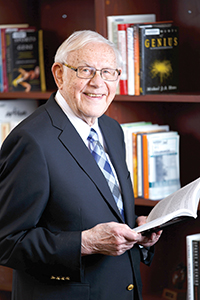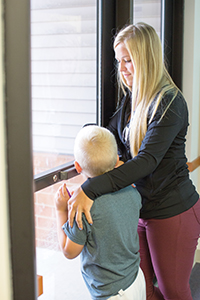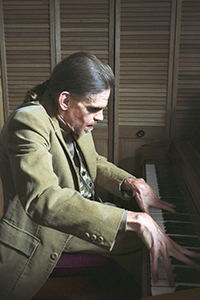By MARGARET GILLERMAN
When Rain Man with Dustin Hoffman was being made in the late 1980s, the movie script was sent to a doctor who's recognized by many as the world's foremost expert on savant syndrome related to autism.

Dr. Darold A. Treffert
That consultant is Dr. Darold A. Treffert, a psychiatrist with Agnesian HealthCare in Wisconsin. He has called savant syndrome an "island of genius" that exists alongside severe cognitive disability. Treffert, 83, has studied the mysteries of savant syndrome for more than half a century, working in association with Agnesian HealthCare, based in his hometown, Fond du Lac, for much of it. He has documented the behaviors and challenges faced by the past century's best known autistic savants.
Describing his personal evolution as a researcher, he wrote, "I have learned to care as much about the savant who has the condition, as I have about the condition the savant has." His experience led him to look for and nurture human potential in whatever form it exists.
Treffert was a friend of the late Kim Peek, a savant upon whom Hoffman's character was partly based. Peek did not have autism, rather a rare genetic syndrome caused his severe cognitive disability. Although he could not dress or brush his teeth without help, Peek had a genius for memorization.
Before the age of 2, he had memorized eight volumes of the encyclopedia. Peek memorized about 12,000 books in his life and was like a "living Google," Treffert said, reciting facts, figures and dates on subject as diverse as sports, history, geography, music and literature.

Joshua Klebs, age 3, enjoys playtime at the Treffert Academy's summer day care program.
The Treffert Center
This spring, the long partnership between Treffert and Agnesian HealthCare reached a new pinnacle when the system opened the Treffert Center on the St. Agnes Hospital campus in Fond du Lac. The center brings together the health system's multidisciplinary autism-related services under one roof and also establishes a Treffert Library of the psychiatrist's pioneering writings, research and broadcasts. His findings are in more than 50 international publications; his first book is in 10 languages.
The Treffert Center incorporates Agnesian's autism services as Agnesian's Treffert Clinic. A third facet of the center is the Treffert Academy, for children of all abilities.
The Treffert Library, with an office for Treffert, is open to scholars and practi-tioners from around the world as well as to the public. Treffert hopes to encourage more global research into savant syndrome, hyperlexia — extraordinarily early reading ability — and other exceptional human brain potential.
It will be "the first and only savant syndrome institute in the world," Treffert said.
Human potential
Matt Doll, a psychologist who is Agnesian HealthCare's director of behavioral health for autism services, was instrumental in establishing the Treffert Center. He said, "At its core, the Treffert Center invites individuals, families and communities worldwide to explore the potential of the human mind, focusing on strengths rather than limitations."
The clinic team works with families with children facing autism spectrum disorders and other related disorders such as
attention deficit/hyperactivity disorder, Doll said. Early diagnoses and intervention help to achieve optimum outcomes.
The team includes, in addition to Doll, a physician, nurse practitioner, occupational therapist, speech language pathologist, psychotherapist and other behavioral specialists.
Inclusive learning
The Treffert Academy has brightly colored and child-friendly classrooms and play areas for children of all abilities who are ages two and a half to 12. Unlike at some schools and day care facilities, children with autism are welcome, said Leah Smet, academy supervisor.
According to Doll, "An inclusive environment benefits both typically developing children as well as children with identified needs."
The academy offers full- and part-time care year-round. The focus is on developing empathy, self-regulation and social-emotional skills so children enter school ready to learn and better able to reach their individual potential.
Also at the center is Agnesian Beyond Boundaries of Autism, or ABBA, which provides in-home services to families and children across the state. Vivian Hazell, a licensed professional counselor and supervisor of ABBA, said that Treffert's approach to his life's work — focusing on the strengths not deficits of people — is reflected in all the Treffert Center programs.
Savants Treffert has known
Treffert's interest in savants began in 1962 when he was asked to start a unit for children and adolescents at Winnebago Mental Health Institute, a residential state institution, near Oshkosh, Wis. He had just completed his residency in psychiatry at University Hospital in Madison, Wis.
The 25 to 30 children in the Winnebago unit were autistic, and three showed incredible talents.
"One boy had memorized in precise detail the entire bus system of the city of Milwaukee," Treffert said.

A young student is comforted by Kelsey Kaiser, a behavioral treatment technician at Agnesian HealthCare's Treffert Academy in Fon du Lac, Wis. The academy enrolls typically developing children and children with identified needs, teaching self-regulation and social and emotional skills.
"With another you could put a 200 piece jigsaw puzzle on the table in front of him — picture side down — and he would put it together just from the geometric shapes. A third little guy was an expert on what happened on this day in history."
That launched Treffert's exploration into savant syndrome.
An extraordinary moment came in 1980 when the doctor met Leslie Lemke, who had come to Fond du Lac to perform a piano concert.
"Leslie is blind, cognitively disabled and has never had a music lesson in his life," Treffert said. "Yet upon hearing it only once, he can reproduce a piece of any length flawlessly." His foster mother, May Lemke, who took in the baby at birth, had discovered that when she heard Leslie, then 14, playing Tchaikovsky's Piano Concerto No. 1 after hearing it once in a movie.
National media, including Walter Cronkite, picked up Lemke's story and in 1983, so did "60 Minutes."
"Dustin Hoffman…was moved to tears by Leslie's story," Treffert recalls. Hoffman went on to play the autistic savant character Raymond Babbitt in Rain Man, which won four Oscars including best picture in 1989.
"That movie gave huge visibility to autism and savant syndrome around the world and made 'autistic savant' a household term," Treffert said.
Full circle with Agnesian
Treffert's medical association with Agnesian HealthCare began in 1962, but his link goes back further.
"Actually I was born at St. Agnes Hospital," Treffert said.
Before the center opened, Treffert's work had been stored in the family home in Fond du Lac, where he and his wife Dorothy graciously welcomed international visitors for decades to the modest quarters.
They "were surprised you needed to turn left at the washing machine and right at the refrigerator," he said with a chuckle.
Treffert's daughter Joni Stine had wanted the library to be housed as a public collection as a way to preserve and expand her father's legacy. "My daughter has given some months of her life to create this remarkable, one of a kind, beautiful library, bringing such artful organization to my disorganized collections," Treffert said.
"I have had other invitations and have explored other settings, but finally decided, at St. Agnes' kind invitation that this would be the place most appropriate and most welcoming," Treffert said.
Intellectual pursuits
The walls of the Treffert Center are filled with artwork by savants whom Treffert has known.
One remarkable work in the lobby is a smaller print of a renowned 5 and a half yard panorama of the city of Rome by British savant Stephen Wiltshire. After a 40-minute helicopter flight over the city, he accurately drew Rome from memory building by building, window by window, with the correct number of columns in the Pantheon.
This spring, a mother from Kuwait wrote Treffert after she had read his 2011 scientific paper discussing hyperlexia — a syndrome characterized in part by reading as early as two and a half. The ability is sometimes, but not always a savant-like skill linked to autism. The paper offered some advice for getting the right diagnosis and treatment. She thanked Treffert for giving her "happiness and hope" about her son's condition.
Treffert said later: "If there is to be a legacy for Treffert Center, let it be that: happiness, help and hope to all the children and families we have had the privilege to lovingly serve."
At the opening of the center April 10, Treffert appeared with Doll and Steve Little, Agnesian HealthCare's president and chief executive. He thanked the health system for "this magnificent opportunity to carry out our missions of research, enlightenment and treatment in a climate of love, happiness, help and hope for all that come here."
| What is savant syndrome?  Leslie Lemke, a piano virtuoso and savant, performs at home in Wisconsin in 2001.
Photo by: Ethan Hill/Contour Collection/Getty Images "Savant syndrome is a rare, but extraordinary, condition in which persons with serious mental disabilities, including autistic disorder, have some 'island of genius' that stands in marked, incongruous contrast to overall handicap," said Dr. Darold A. Treffert, an expert on the condition. A person with a very low IQ, indicative of severe mental disability, may demonstrate extraordinary intelligence in mathematics, calendar calculation, art, music or memorization. In the most spectacular cases, Treffert wrote in a 2009 journal article, savant syndrome is a "jarring juxtaposition of severe mental handicap and prodigious mental ability." A person who is autistic may have savant skills grafted on to that basic autistic disorder but only as many as one
in 10 autistic persons have special abilities. Not all savants are autistic. Savant syndrome also may be caused by other developmental disabilities or central nervous system injuries or disease. In rare cases, an ordinary "neurotypical" person without a disability suddenly may acquire savant skills after a head injury, dementia or a nervous system disease. That phenomenon is called acquired savant syndrome. "While most of us fall into the normal range of functioning, we have learned from acquired savants that we all have a great deal more hidden potential," Treffert said. "The challenge is how to tap into the potential and hidden talent within all of us. …This is what we are trying to do at the
Treffert Center by taking a strength-based approach to child care, as well as our assessments and treatments." Treffert has identified levels of savant skills, ranging from "splinter skills" to "talented" to "prodigious." The latter category includes people who, were it not for disability, would be called genius. In all cases, the doctor said, a person's strengths and talents must be encouraged to bring about self-esteem, and every person must feel loved and accepted. — MARGARET GILLERMAN |
Copyright © 2016 by the Catholic Health Association
of the United States
For reprint permission, contact Betty Crosby or call (314) 253-3477.